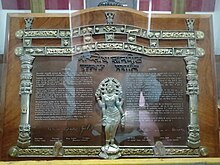| Jnanpith Award | |
|---|---|
| Award for individual contributions to Literature Instituted in 1961 | |
 Citation plaque | |
| Awarded for | Literary award in India |
| Sponsored by | Bharatiya Jnanpith |
| Formerly called | Aditya |
| Reward(s) | ₹11 lakh (equivalent to ₹17 lakh or US$20,000 in 2023) |
| First awarded | 1965 |
| Last awarded | 2023 |
| Most recent winner | • Gulzar • Rambhadracharya |
| Highlights | |
| Total awarded | 64 |
| First winner | G. Sankara Kurup |
| Website | jnanpith |
The Jnanpith Award is the oldest and the highest Indian literary award presented annually by the Bharatiya Jnanpith to an author for their "outstanding contribution towards literature". Instituted in 1961, the award is bestowed only on Indian writers writing in Indian languages included in the Eighth Schedule to the Constitution of India and English,[a] with no posthumous conferral.[2]
From 1965 till 1981, the award was given to the authors for their "most outstanding work" and consisted of a citation plaque, a cash prize and a bronze replica of Saraswati, the Hindu goddess of knowledge and wisdom.[3][4][5] The first recipient of the award was the Malayalam writer G. Sankara Kurup who received the award in 1965 for his collection of poems, Odakkuzhal (The Bamboo Flute), published in 1950.[6] The rules were revised in subsequent years to consider only works published during the preceding twenty years, excluding the year for which the award was to be given and the cash prize was increased to ₹1.5 lakh (equivalent to ₹31 lakh or US$37,000 in 2023) from 1981.[7]
As of 2015[update], the cash prize has been revised to ₹11 lakh (equivalent to ₹17 lakh or US$20,000 in 2023) and out of twenty-three eligible languages the award has been presented for works in sixteen languages: Hindi (eleven), Kannada (eight), Bengali and Malayalam (six each), Urdu (five) Gujarati, Marathi, Odia (four each), Assamese and Telugu (three each), Punjabi, Tamil, Konkani and Sanskrit (two each), English, Kashmiri and (one each). The award has been conferred upon fifty-eight writers including eight women authors. In 1976, Bengali novelist Ashapoorna Devi became the first woman to win the award and was honoured for the 1965 novel Prothom Protishruti (The First Promise), the first in a trilogy.[b][8] The most recent recipients of the award are Sanskrit scholar Rambhadracharya and Urdu writer, Bollywood lyricist Gulzar jointly awarded for the year of 2023.
- ^ "The Constitution of India: Eighth Schedule" (PDF). Ministry of Home Affairs (India). p. 1. Archived from the original (PDF) on 5 March 2016. Retrieved 15 May 2016.
- ^ "Proposal for the 52nd Jnanpith Award" (PDF). Bharatiya Jnanpith. 18 April 2016. Archived from the original (PDF) on 9 May 2016. Retrieved 28 May 2016.
- ^ "Jnanpith Award @ Bharatiya Jnanpith". Bharatiya Jnanpith. Archived from the original on 9 March 2016. Retrieved 28 May 2016.
- ^ "Gujarati writer Raghuveer Chaudhary chosen for Jnanpith Award". The Hindu. New Delhi. 30 December 2015. Archived from the original on 16 December 2016. Retrieved 22 May 2016.
- Bhattacharji, Jaya Rose (31 January 2015). "The prize is right?". The Hindu. Archived from the original on 3 February 2018. Retrieved 22 May 2016.
- ^ "Vasant Panchami, a celebration of Goddess Saraswati" (PDF). Government of Odisha. Archived from the original (PDF) on 10 August 2014. Retrieved 28 May 2016.
- ^ Natarajan, Nalini; Nelson, Emmanuel Sampath (1996). Natarajan, Nalini; Nelson, Emmanuel Sampath (eds.). Handbook of Twentieth-century Literatures of India. Greenwood Publishing Group. p. 187. ISBN 978-0-313-28778-7. Archived from the original on 7 July 2017.
- ^ Cite error: The named reference
Dattawas invoked but never defined (see the help page). - ^ Surendran, K. V. (1999). Indian Women Writers: Critical Perspectives. Sarup & Sons. p. 163. ISBN 978-81-7625-072-6. Archived from the original on 30 September 2017.
- Ames, Roger T.; Kasulis, Thomas P.; Dissanayake, Wimal (1998). Ames, Roger T.; Kasulis, Thomas P.; Dissanayake, Wimal (eds.). Self as Image in Asian Theory and Practice. SUNY Press. p. 163. ISBN 978-0-7914-2725-5. Archived from the original on 3 February 2018.
Cite error: There are <ref group=lower-alpha> tags or {{efn}} templates on this page, but the references will not show without a {{reflist|group=lower-alpha}} template or {{notelist}} template (see the help page).